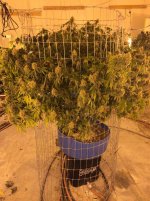DONAJTHEIII
Member
Who told you hydroponic nutrients kill bennies?
Okay a couple of extracts from some material I am covering on this now:
The majority of soil living beneficial bacteria require oxygen for cellular respiration (also termed “oxidative metabolism”). Bacteria that require oxygen are classed as aerobes. Aerobes also require organic material or molecules (such as glucose) to produce energy. For this reason this class of bacteria are also called aerobic heterotrophs (i.e. aerobic heterotrophs are organisms that cannot live without free oxygen and do not produce their own food).
The main elements required for beneficial bacterial nutrition are C, H, O, N, S, P, K, Mg, Fe, Ca, Mn and traces of Zn, Cu and Mo.
‘Aerobic heterotrophs’ require a source of organic carbon, gaseous oxygen (air) and water along with the aforementioned mineral elements. Their source of energy is produced by the aerobic oxidation of organic material by metabolism to water and carbon dioxide. The energy released is stored in the phosphoanhydride bonds of ATP. When the energy is required it is released from ATP by hydrolysis. Certain environmental conditions are also required for the growth and division of bacteria like O2 concentration, pH and temperature.
ATP stands for Adenosine Tri-Phosphate. ATP consists of an adenosine molecule and three inorganic phosphates. ATP is the most important energy-transfer molecule in all living cells. ATP transports chemical energy within cells for metabolism. ATP is produced during photosynthesis and cellular respiration and used by enzymes and structural proteins in cellular processes, including biosynthetic reactions and cell division.
Phosphorous/phosphate plays a vital role in the ATP chain. Inorganic phosphorus in the form of the phosphate PO43- plays a major role in biological molecules DNA and RNA where it forms part of the molecular structure. Living cells use phosphate to transport cellular energy in the form of ATP. Nearly every cellular process that uses energy obtains it in the form of ATP. ATP -------> ADP (Adenosine Diphosphate) + Pi (orthophosphate) + energy.
For beneficial bacteria to survive in a hydroponic environment they will need ideal environmental conditions. Most hydroponic nutrients lack organic carbon sources for beneficial bacteria to survive. They can metabolise humic and fulvic extracts but one of the best sources of food for beneficial bacteria is molasses. Molasses typically contains ‘Total Digestable Nutrients’ (TDN) in excess of 60%, as well as containing a number of the major elements and trace elements required by bacteria, molasses is very high (50%+) in sugars. The sugars contained in molasses are an ideal source of carbon for heterotrophs. Cobalt and molybdenum, which are not usually listed in the typical analysis of molasses, will still be found in small traces.
Basically while the science is complex (a point too many overlook) it is dead easy to turn your nutrient tank into a micro tea brewer. You should also be watering the bennies into the substrate by hand but most importantly you need to provide a food source (i.e. carbon and other). You need to also filter your air using a 0.22 micron syringe filter. Unwanted microorganisms are present in air.
I'll post more on this shortly on manic botanix. Yeah - a lot of what you said was very wrong. I use a ferment of molasses at 1ml/L in my tank and a potato dextrose starch/broth at 1ml/L and never dump. I'm run to waste. Sort of can't believe the levels of misinformation that get spat around forums.
I stopped reading your response after the first line because of how ignorant you are. I didnt ask for basic science info regarding processes/reactions that I already learned in college. You shouldnt be shocked at "the level of misinformation thats spat around these forums "you should be shocked on how ignorant people can be when others are simply trying to help and offer a different perspective.
Ill state one common hydroponic nute that people use on the regular that has been proven to kill bennies. Drip Clean it contains an "IDE" and when the dosage is doubled such as many do to reduce salt buildup it will knock out bennies. Ever here of hydrogen peroxide killing shit before ? "IDE" basic chemistry. Nothing you stated can happen if the environment isnt correct didnt you see the analogy already smh
Your to quick to defend with scientific info that doesnt relate. Im not trying to come off as a douche but stop being so narrow minded no one has anything to prove here you dont know everything clearly and neither do I but I dont go stating stuff without scientific data to back it up and unless Ive seen it hands on.
Cant anyone take constructive criticism anymore without getting their panties wet. Geez
Were all here to help each other
AJAE





